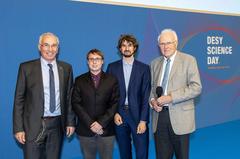From left: DESY Director Helmut Dosch, awardees Alexander Knetsch and Stefan Zeller, Friedrich-Wilhelm Büßer, Chairperson of the VFFD (photo: DESY/B. Stachowske).
Alexander Knetsch and Stefan Zeller have been awarded the 2018 doctoral students’ prize by the Association of the Friends and Supporters of DESY (VFFD). The prize was presented to them yesterday evening as part of DESY’s Science Day in recognition of their excellent doctoral theses.
Alexander Knetsch studied physics at the Technical University of Darmstadt from 2007, and was awarded his master’s degree in laser plasma physics by the GSI Helmholtz Centre for Heavy Ion Physics in 2013. In the interim, Knetsch, who was born in Rio de Janeiro, studied at the Universidade de São Paulo in Brazil for five months. He completed his doctoral thesis entitled “Acceleration of laser-injected electron beams in an electron-beam driven plasma wakefield accelerator”, in the field of accelerator physics at DESY and the University of Hamburg. In it, he examines the development of new types of plasma accelerators which are driven by electron beams. With their high accelerating fields, these not only have the potential to drastically reduce the size of future accelerators; new high-quality electron beams can also be formed in the plasma wake of a driving electron beam. This means that the plasma can at the same time serve as a source of particles for electron beams displaying unique properties. In the course of his PhD research, Alexander Knetsch was able to demonstrate experimentally two injection methods for this at the SLAC National Laboratory in California. In the meantime, Alexander Knetsch has become a fellow at DESY in the field of experimental particle physics.
Stefan Zeller, from Frankfurt, started studying physics in 2005 at the Goethe University in Frankfurt. In 2012, he was awarded his master’s degree for a paper in the field of nuclear, molecular and ion physics. He received a doctoral scholarship from the Helmholtz International Centre FAIR (Facility for Antiproton and Ion Research) and took part in the programme of the Helmholtz Graduate School for Hadron and Ion Research. In 2016, he was awarded the Helmholtz Prize for Precision Measurement in Fundamental Research for measuring the binding energies of molecular quantum halos with nanoelectronvolt precision. In his doctoral thesis entitled “The Helium Dimer”, which Zeller wrote at the Goethe University in Frankfurt, he used the free-electron laser FLASH to measure the distribution of atoms along the weakest naturally existing bond between two helium atoms. Although it was known that two helium atoms form an extremely large molecule, no one had yet actually managed to observe the structure of these ultra-cold helium molecules. The group of scientists working with Stefan Zeller used the extreme brightness of FLASH to remove electrons from the helium molecule in a carefully controlled way, while measuring its shape with extreme precision. The same technology can be applied to many other molecules having an even more mysterious structure.








